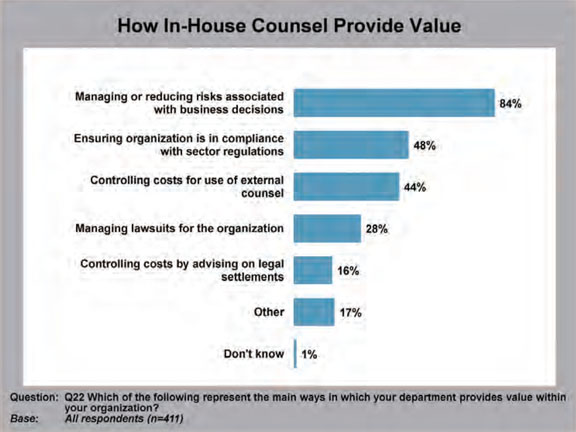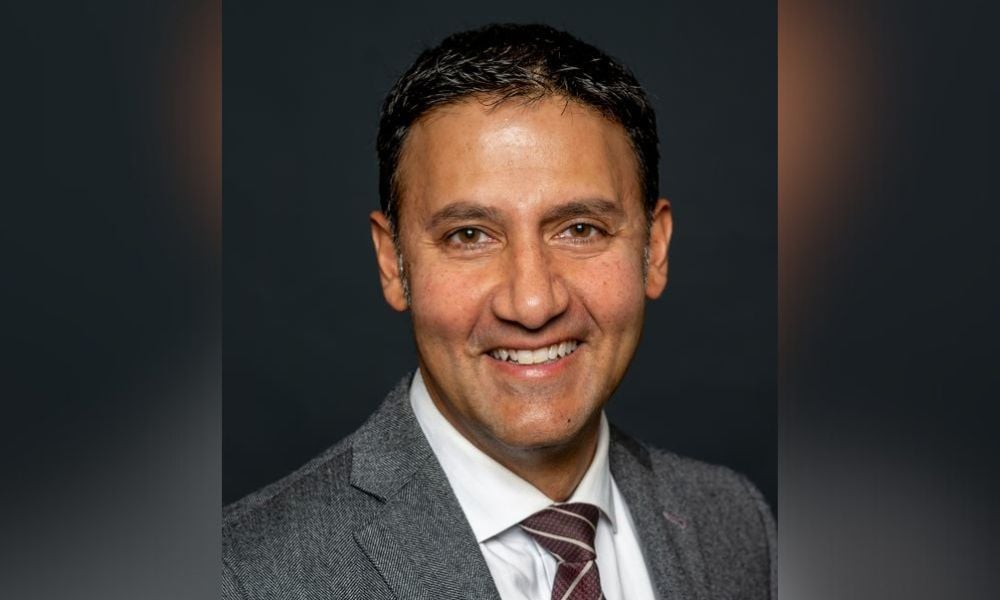Canadian in-house counsel say their organizations value them most for providing risk management, followed by regulatory compliance advice and controlling external costs, according to a recent survey.
 The 2012 In-House Counsel Barometer survey conducted by Angus Reid Public Opinion and sponsored by Davies Ward Phillips & Vineberg was presented yesterday in Montreal during the Canadian Corporate Counsel Association’s national spring conference.
The 2012 In-House Counsel Barometer survey conducted by Angus Reid Public Opinion and sponsored by Davies Ward Phillips & Vineberg was presented yesterday in Montreal during the Canadian Corporate Counsel Association’s national spring conference.
The survey, completed by 411 Canadian in-house counsel, shows that providing value as in-house counsel is closely tied to managing or reducing risk with 84 per cent of participants citing risk management, followed by ensuring regulatory compliance (48 per cent), and controlling costs of external counsel (44 per cent) as the top ways they provide value in their organization.
The majority of in-house counsel taking part in the survey also say they feel the work they do is valued in their organization.
Participants were asked to indicate whether they feel the work they do is valued within their organization and 93 per cent said they feel they either valued or highly valued with an additional 28 per cent feeling they are moderately valued within their organization.
The majority of those surveyed — 82 per cent — who work for publicly traded companies reported that they work in an environment with strong support from management. Also, 68 per cent believe their organization would like to bring more work inside the organization, rather than outsource. However, three in 10 feel the organization they work for does not make appropriate use of their role.
A majority — 64 per cent — feels they often have internal clients who act without seeking legal advice, up 11 points from 2011.
The survey did show there was no connection between the type of law practised and whether an in-house counsel felt valued.
“There appears to be no relationship between the type of law you practice and feeling valued, it has more to do with the company you work for,” said Andrew Grenville, chief legal officer with Angus Reid Public Opinion who presented the findings.
The survey also revealed that key performance indicators are in place for two in five in-house counsel. Reviews of the implementation of KPIs for in-house counsel remain mixed, as they were in last year’s survey. Although the majority of in-house counsel working for an organization that has KPIs in place report they help prove the value of in-house counsel (58 per cent), a majority also feels KPIs are good in theory, but poor in practice (62 per cent). This is on par with findings from 2011, when KPIs were first evaluated.
In terms of hours worked by in-house counsel in Canada, those working for a wholly owned subsidiary of a public company work, on average, the most hours per week at 49 hours, followed closely by those who work for a public company at 48 hours or private company at 47 hours. In-house counsel working for not-for-profit organizations work an average of 45 hours, while those working in government work the fewest of all at 44 hours.
The hours in-house counsel are putting in apparently don’t allow for longer-term planning and pose the biggest challenge for them. New to the survey for 2012, participants were asked to rank eight challenges their profession faces. A majority (65 per cent) said the day-to-day workload leaves little time for “big picture thinking” or the development of initiatives which would benefit the organization as a whole.
The “lack of simple and inexpensive matter management software tools for smaller law departments” was identified by 15 per cent of in-house counsel in public companies as the most important challenge.
In-house counsel also appear to be loyal to their employers. The average number of years in-house counsel have worked for their current employer is six, down one from 2011.
 The 2012 In-House Counsel Barometer survey conducted by Angus Reid Public Opinion and sponsored by Davies Ward Phillips & Vineberg was presented yesterday in Montreal during the Canadian Corporate Counsel Association’s national spring conference.
The 2012 In-House Counsel Barometer survey conducted by Angus Reid Public Opinion and sponsored by Davies Ward Phillips & Vineberg was presented yesterday in Montreal during the Canadian Corporate Counsel Association’s national spring conference.The survey, completed by 411 Canadian in-house counsel, shows that providing value as in-house counsel is closely tied to managing or reducing risk with 84 per cent of participants citing risk management, followed by ensuring regulatory compliance (48 per cent), and controlling costs of external counsel (44 per cent) as the top ways they provide value in their organization.
The majority of in-house counsel taking part in the survey also say they feel the work they do is valued in their organization.
Participants were asked to indicate whether they feel the work they do is valued within their organization and 93 per cent said they feel they either valued or highly valued with an additional 28 per cent feeling they are moderately valued within their organization.
The majority of those surveyed — 82 per cent — who work for publicly traded companies reported that they work in an environment with strong support from management. Also, 68 per cent believe their organization would like to bring more work inside the organization, rather than outsource. However, three in 10 feel the organization they work for does not make appropriate use of their role.
A majority — 64 per cent — feels they often have internal clients who act without seeking legal advice, up 11 points from 2011.
The survey did show there was no connection between the type of law practised and whether an in-house counsel felt valued.
“There appears to be no relationship between the type of law you practice and feeling valued, it has more to do with the company you work for,” said Andrew Grenville, chief legal officer with Angus Reid Public Opinion who presented the findings.
The survey also revealed that key performance indicators are in place for two in five in-house counsel. Reviews of the implementation of KPIs for in-house counsel remain mixed, as they were in last year’s survey. Although the majority of in-house counsel working for an organization that has KPIs in place report they help prove the value of in-house counsel (58 per cent), a majority also feels KPIs are good in theory, but poor in practice (62 per cent). This is on par with findings from 2011, when KPIs were first evaluated.
In terms of hours worked by in-house counsel in Canada, those working for a wholly owned subsidiary of a public company work, on average, the most hours per week at 49 hours, followed closely by those who work for a public company at 48 hours or private company at 47 hours. In-house counsel working for not-for-profit organizations work an average of 45 hours, while those working in government work the fewest of all at 44 hours.
The hours in-house counsel are putting in apparently don’t allow for longer-term planning and pose the biggest challenge for them. New to the survey for 2012, participants were asked to rank eight challenges their profession faces. A majority (65 per cent) said the day-to-day workload leaves little time for “big picture thinking” or the development of initiatives which would benefit the organization as a whole.
The “lack of simple and inexpensive matter management software tools for smaller law departments” was identified by 15 per cent of in-house counsel in public companies as the most important challenge.
In-house counsel also appear to be loyal to their employers. The average number of years in-house counsel have worked for their current employer is six, down one from 2011.







